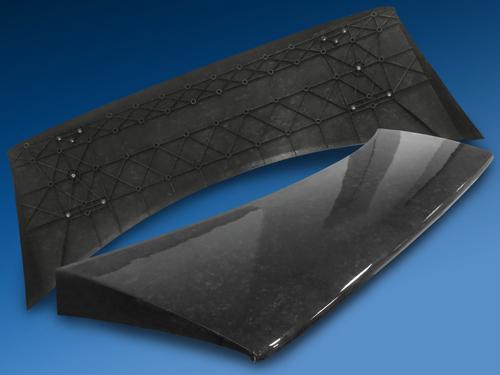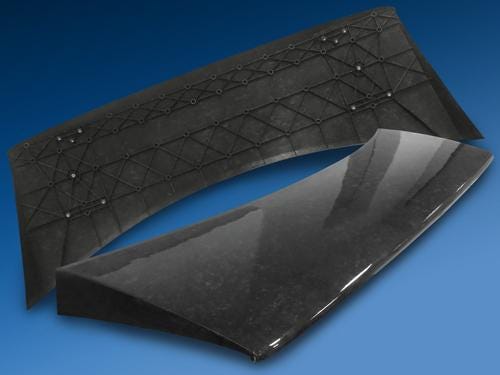Carbon & Fiberglass Composite Compound Is Cheaper
March 5, 2014

We've written about the hassles involved in making advanced, thermoset carbon fiber composites cheap enough and fast enough for high-volume, automated automotive manufacturing. R&D by Dow Automotive and Ford, for example, is ongoing. BMW has a first in its all-carbon composite body-in-white, as we've reported. For that structural application, these traditional materials are what's needed.
But for semi-structural and some structural parts in a car, carbon fiber compression molding compounds work well, and are faster to produce than the autoclave-dependent advanced materials. They're still pricey, though. One way to lower that price is by combining them intelligently with other fibers, like glass. That's what Quantum Composites has done.

The company's new advanced molding compound, AMC-8590-12CFH, is a hybrid material consisting of about 50% of each fiber by volume, and 21% carbon fiber and 30% glass fiber by weight, Matt Douglas, product manager, told us. It's made with a blend of chopped fibers that are homogeneously distributed throughout the matrix. It's then compression molded in a hydraulic press with a hard steel tool, using heat and pressure to cure the part and consolidate the material in the mold. You can watch this process in a video here starting at about 1:35.
The material is aimed at replacing both fiberglass and metals in parts made with compression molding for industries such as automotive, heavy truck, medical, sporting goods, and industrial. Its properties are between a fiberglass sheet molding compound and one that's all carbon fiber, said Douglas. It's also got a weight advantage over an all-fiberglass compound, although it's also about 7% denser than an all carbon fiber compound.
Physical properties are inherently better than those of an injection-molded thermoplastic. You can check those specs out in the AMC-8590-12CFH data sheet. It gives these for uncured material, and for cured specimens. You'll need to scroll down a couple pages past the press release to access it.
The big difference compared to traditional advanced thermoset carbon composites is the price of the new hybrid compound: It's comparable to the price of high-performance fiberglass compounds, such as a vinyl ester resin system with 50% to 60% glass fiber, said Douglas. Of course, the tensile modulus is considerably better, and so is the flexural modulus. Another big difference between AMC-8590-12CFH and traditional carbon composites is its fast cure times, making it more suitable to high-volume automotive production. Examples of auto parts where this could be used include underbody diffusers, floorpans, inner doors and decks -- inner structural panels.
The new hybrid is part of Quantum Composites' Engineered Structural Composites, high fiber-reinforced compression molding compounds used to replace metals in military/aerospace and oil and gas applications. These are carbon or glass fibers in matrixes of epoxy, vinyl ester and polyester, phenolic, BMI, or polyimide resin.
Related posts:
About the Author(s)
You May Also Like



